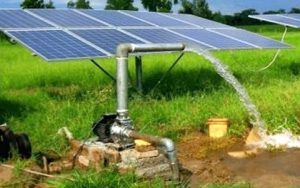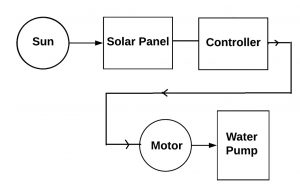At present, solar panels play an essential role to pump the water to agriculture, in remote areas, and where an alternative energy source is required. In rural areas, people have to work extra for water because of unseasonal rains as well as the unpredictable nature. To overcome this problem, a solar water pump is the best solution for allowing residents in these regions to spend extra time for growing crops and to increase their income. Day by day, the cost of diesel and electricity is rising continually. So for rural areas, these pumps are perfect due to long product life and less maintenance cost. This article discusses what is a solar pump, block diagram, types, working, and its applications.
What is a Solar Pump?
The solar pump definition is, a pump that is used to pump the water for different applications using solar energy. Alternate names of this pump are solar pumping system, solar water pump, and solar submersible pump.

solar-pump
The connection of this pump can be done by connecting this pump to a controller. When the sunlight falls on the solar panel, then this pump starts to pump the water by lifting from the ground. It doesn’t need electricity to run the pump. This pump is more economical and used where electricity is not available.
These pumps are mostly used in agriculture and horticulture fields by farmers and also used in foundation, swimming pools, water circulation, etc.
Solar Pump Block Diagram
The solar water pump can be built with a solar panel, pump, controller, and motor. The block diagram of this pump is shown below.

solar-pump-block-diagram
The solar water pump block diagram mainly includes a solar panel, water pump, electric motor, and controller. Generally, this pump works by using electricity from the solar panel. The solar panel receives solar energy and stores it. The motor is used to manage AC or DC and finally, the controller adjusts the speed & output power.
Solar Pump Working
The system of solar water pump works on the photovoltaic principle which converts the energy from solar to electricity to run the water pump. This pump draws the water from the pond, bore well, open well, canal, etc. This system needs a shadow-free region for the solar panel fixing.
Types of solar pumps
Solar water pumps are classified into different types based on the application however there are two types of solar pumps that are used mostly due to its success rate such as submersible solar pump & surface pump. These pumps are available in both AC & DC technology.
1). Solar Surface Pump
The solar surface pump is mainly recommended for where the deepness of water is below 15 meters and you wish to lift above ground level.
These pumps are used in the irrigation field, communities for supplying clean water while supplying water from ponds, lakes, rivers or canals.
2). Solar Submersible Pump
A solar submersible pump is mainly recommended for where the deepness of water is above 15 meters and you wish to lift above ground level. These pumps are arranged in the underground water. These pumps are the most selling ones in India because the deepness of the water level is extremely low in the utmost areas.
The solar pump applications mainly involve in the irrigation field, communities for supplying clean water while supplying water from sumps or bore-wells.
Please refer to this link to know more about Renewable Energy MCQs
Solar Pump Advantages/Disadvantages
The advantages of solar pumps are
- Strong design
- Environmental
- Simple installation
- Operates for a long time
- Simple to work and maintain
- Highly consistent and robust
- It can be used even in remote areas.
- These are easy to relocate.
- Conventional grid electricity is not required
- Without fuel, it works
- Less operating cost
- Less maintenance
The disadvantages of solar pumps are
- It is costly.
- The solar panel output mainly depends on the climate.
- It needs a battery & water storage tank.
Solar pump efficiency is crucial in the water pumping system because it defines how much water can be supply a system with the available power. By using an efficient system one can spend less time for the same quantity of water otherwise acquire extra water from a similar power source.
Thus, this is all about an overview of solar water pumps, these are very popular to select for watering domestic animals, in agriculture, industries, residential as well as swimming pools. Here is a question for you, what are DC & AC solar water pumps?